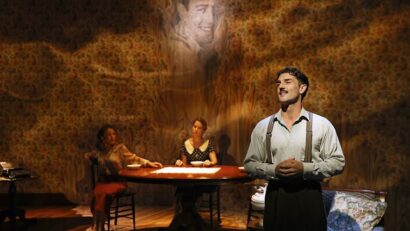
The Glass Menagerie: the haunting beauty of Tennessee Wiliams’ play endures in this Sydney revival
Tennessee Williams (1911-1983) is widely regarded as one of America’s greatest playwrights. A prolific and unabashedly autobiographical writer, Williams’ career spanned four decades of the 20th century.
The Glass Menagerie, which premiered in Chicago on December 26 1944, was the writer’s first major success. It won scores of national theatrical awards and catapulted Williams to enduring fame.
An engrossing new production of the classic play, currently running at Sydney’s Ensemble Theatre, does more than simply revive the famous piece of theatre. It revitalises it for modern audiences.
A troubled family from St. Louis
The Glass Menagerie is a lyrical exploration of memory, longing and familial obligation.
Set in the 1930s in St. Louis, the play revolves around three adult members of the Wingfield family: Tom, a restless and possibly closeted young man torn between duty and desire; Laura, his painfully shy sister, whose physical disability and introversion leave her isolated from the world; and Amanda, their domineering but fragile mother who clings to faded Southern dreams.
The plot is simple, and draws direct inspiration from Williams’ troubled family life. The Wingfields are struggling to get by. They live in a cramped apartment, in the shadow of an absent patriarch who we hear “fell in love with long distances” a long time ago.
Amanda is desperate to secure a future for Laura. She pins her hopes on the arrival of a “gentleman caller”, convinced that marriage is the only hope for her daughter’s security.
The plot follow the Wingfields, a small family struggling to get by in the 1930s in St. Louis.
Prudence Upton
When Tom – who is also the play’s narrator (a cutout for Williams himself) – invites a colleague to dinner, the overbearing Amanda seizes the opportunity to present Laura in the best possible light. Suffice to say, things do not end well.
Lifting lyricism to its highest level
Potted plot summaries don’t really do The Glass Menagerie justice.
As Liesel Badorrek, director of the new production at Sydney’s Ensemble Theatre, points out, “Williams wanted to break with the prosaic realism that he felt had dominated the American theatre” and fashion a new, more symbolic approach to theatre, where memory and emotion take precedence over conventional forms of dramatic action.
According to Williams himself, his aim was to demonstrate
that truth, life, or reality is an organic thing which the poetic imagination can represent or suggest, in essence, only through transformation, through changing into other forms than those which were merely present in appearance.
To bring his vision to life, Williams combined heightened poetic dialogue, repeated musical motifs and unconventional stagecraft. In doing so, he intentionally blurred the lines between reality and memory, allowing the audience to experience the emotional truth of the characters, rather than a literal depiction of events.
This innovative approach to dramatic form was revolutionary at the time and became a hallmark of Williams’ mature work. As Arthur Miller once wrote:
The Glass Menagerie in one stroke lifted lyricism to its highest level in our theatre’s history, but it broke new ground in another way. What was new in Tennessee Williams was his rhapsodic insistence that form serve his utterance rather than dominating and cramping it.
Ensemble Theatre revives Williams’ play in a way that is both timeless and transcendent.
Prudence Upton
A fresh take with remarkable depth
Miller’s observations about poetic rhapsody and form are worth keeping in mind when discussing the Ensemble Theatre’s impressive take on The Glass Menagerie.
One of the great merits of the production is how it does justice to Williams’ formal innovations while also engaging the audience on an emotional level.
Making excellent use of expressionistic lighting (Verity Hampson) and sound design (Maria Alfonsine and Damian de Boos-Smith), Badorrek’s production strikes a fine balance between preserving the play’s delicate, dreamlike structure and grounding its characters in charged performances that feel immediate and often painfully real.
Deftly blending humour and pathos, the cast of four delivers strong performances that ensure the play’s vivid lyricism enhances (but does not overwhelm) its emotional core.
Blazey Best’s Amanda delivers a tour de force performance.
Prudence Upton
Blazey Best’s Amanda is in equal measure maddening and charming, a true tour de force. Her verbal sparring with Danny Ball’s Tom was an early high point of the evening. One particularly striking moment was staged entirely in silhouette – elongated shadows stretching across the stage’s backdrop.
That said, to me the true standouts were Bridie McKim and Tom Rogers, whose interpretations of Laura and the gentleman caller, Jim, lifted the entire production.
In particular, McKim, who has called for greater disability representation in Australian theatre, brings remarkable depth and dynamism to the role of Laura. She imbues Laura with vulnerability and, crucially, strength.
McKim imbues Laura with both vulnerability and strength.
Prudence Upton
McKim and Rogers breathe new life into this 81-year old staple of the dramatic canon. Their performances render Williams’ work fresh and contemporary, ensuring the play feels as urgent today as it would have in its post-war heyday. Läs mer…
